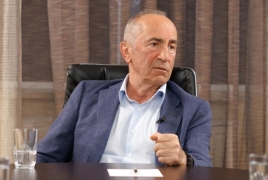
Political analyst Tatevik Hayrapetyan, responding to an interview by Armenia’s second president Robert Kocharyan, argued that he stubbornly refuses to recognize significant changes in Russian policy since his own time in office. Although Vladimir Putin still leads Russia, Hayrapetyan noted that the country’s priorities have changed significantly. She shared these views in a Facebook post.
“Constantly blaming Pashinyan for betraying Russia, and presenting him as the sole cause of our national tragedies, is, to put it mildly, detached from reality,” she wrote.
According to Hayrapetyan, Pashinyan has not taken any major anti-Russian actions. She points to economic indicators and Moscow’s de facto support for Pashinyan in the 2021 snap elections as evidence. Moreover, she claims that Pashinyan’s seemingly pro-European gestures have served as tools for Russia to construct its own “alibi” in Azerbaijan-related dealings over Nagorno-Karabakh.
She added that dependency on any global power—especially in matters of security and economy—is dangerous, as great powers often negotiate at the expense of smaller nations. This behavior is not unique to Russia, she said, noting the U.S. has acted similarly with its allies. Even within Turkish-Azerbaijani relations, frictions arise, which is why Aliyev positions himself as an independent player.
“Have you ever wondered how Aliyev manages to hold military drills with Iran and on the same day discuss deepening defense ties in Tel Aviv?” Hayrapetyan asked. “The world has changed, it has become multipolar. There’s no need to continue the false dichotomy between Russia and Turkey.”
She asserted that while Pashinyan has clearly chosen Turkey as his political sponsor, Kocharyan remains anchored to Russia. However, she argued, this choice is outdated. Instead, Armenia should consider deeper ties with nations like Iran, India, the U.S., and China. These relationships could help resolve security issues, lead to meaningful negotiations, and foster mutually beneficial partnerships. Above all, she stressed, Armenia must remember it has an independent state, potential, and a capable population.
Hayrapetyan concluded that without the emergence of a rational, professional third political force that sees the broader world, Armenia risks following a dangerous path. “We cannot face another Kocharyan-Pashinyan dilemma in 2026,” she warned. “That choice only serves them and their supporters—not the Armenian people.”
Kocharyan, meanwhile, responded to claims that Russia had abandoned Armenia by highlighting that Armenian-Russian relations had not deteriorated from 1991 until recent years. “How was Russia a good partner from 1991 and then suddenly turned bad?” he asked. “Who stopped the 2020 war? I know how hard it was. On October 18, 2020, who offered to halt the war? We refused. The prime minister said we’d fight so he wouldn’t be called a traitor. And now that’s being blamed on Russia?”

